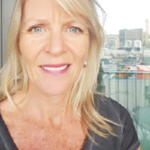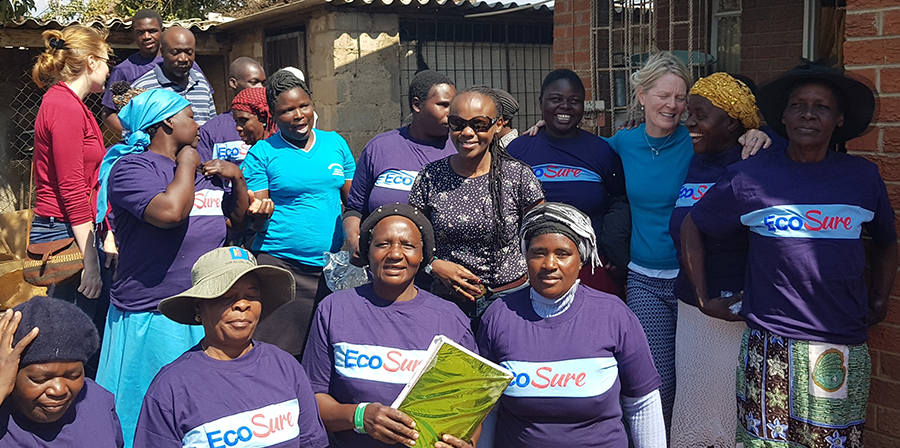“Women need to be listened to. Technology is technology; it is the emotional appeal that will carry the day.”
Godwin Mashiri, General Manager of Econet EcoSure, shares the importance of financial inclusion for women in Zimbabwe and the influential role they play. Watch his full interview here.
——————————–
In early August 2019, in Chitungwiza, a dormitory town approximately 30km south-east of Harare city centre, the Connected Women team met with a Zimbabwean women’s Burial Society. They shared with us the importance to them of giving their family members a respectful send off when they die and how difficult it can be to cover the cost of a funeral. To prepare for what is a certainty, they are all policyholders of Econet Zimbabwe, EcoSure micro insurance funeral cover direct; a product available to Ecocash subscribers (Econet’s mobile money solution).
I had the opportunity to speak with Godwin Mashiri, General Manager of Econet EcoSure, Zimbabwe, responsible for the EcoSure product portfolio. I asked him how they are driving financial inclusion for women in Zimbabwe and the role of the Burial Societies. This is what he had to say.
Q: In 2017, Econet signed the GSMA Connected Women Commitment to increase the proportion of women customers in your mobile money customer base by 2020. Why is financial inclusion for women an important issue for you?
“Financial inclusion of women is a critical issue for us at Econet in that it provides the basis for growth. Women have been noted in our country to push sustainable growth in our products. They also have influence in getting other people to adopt our products. Women’s activity ratios are actually better than for men. They are more stable than men are and they are more loyal. They also give us more insights. They share their opinions on our products, test, and give suggestions as to how we can adjust them. Women play a critical role in assisting us in getting our products understood and consumed by communities. In Africa, they say if you teach a woman you have taught the village. That is how we view women being involved in financial inclusion.”
Q: How does financial inclusion benefit women?
“We have noted of the women who have increased their usage of financial services, they have actually improved in terms of their incomes as opposed to women who have not adopted our products. There has been a marked difference.”
Q: What do you see as the primary challenge to closing the gender gap in mobile money for women in Zimbabwe?
“The challenge women have faced is that men predominantly control the funding. As a result, you find some households have a single mobile phone and that would be in the hands of the men or the father of the house. Women would then need to consult to get access. That has been the main hindrance. Once the women have the handsets you find that it is easier to empower them with our products as opposed to those where the males have the handsets.
“The critical thing for us is to help ensure women have access to handsets, either through loans or through the women’s groups. In certain instances, we have suggested that the women can get together and use one single handset so they learn using a group handset where there is a challenge of getting the males to give them the handset.”
Q: What has been your approach to reaching women with financial services?
“What we have done from an EcoSure and EcoCash perspective is that we used human centred development in developing our products. That entailed going out into the communities to find out how the communities live, what the gaps are, what the challenges are and come up with products that really assist the women in impacting their lives.
“Our approach has been to make use of the community structures that are there. You find that communities are built in a unique African structure and in Zimbabwe you find that there are groups within each community that women belong to. We have approached those groups to disseminate information and be for product adoption and use.
“We engaged with several communities and now have over 4,800 groups of which 80% of those are women groups. In certain circles, they call them stockwells. Each group has its own account and not just for EcoSure products. We have extended loans to each group and have provided them with crockery, cutlery and cooking utensils for their events, such as weddings, burials or graduations. On top of that, some of the groups we work with have been empowered to start projects that generate incomes so they are able to pay their insurance premiums. We believe that empowering these over 4,800 groups has assisted us in getting to a stable premium level.”
Q: Can you share how the Burial Societies work and the role of Ecocash and EcoSure?
“The female led Burial Societies have been structured in such a way that groups elect a committee and most of those committees have women as chairpersons and secretaries. These women have leadership roles in the Burial Society responsible for day-to-day management, collection of insurance premiums and disbursements of claim funds. The societies themselves also have new projects that they lead; the rearing of chicken and goats, sewing and other projects. These generate income not just to pay insurance premiums but also to get the households on a better financial footing.
“All Burial Societies have what we call a Burial Society EcoCash Account which operates in the same manner as a retail account so you can collect revenue through it and you can pay suppliers and then you can pay your insurance premiums. So we haven’t just given them an EcoSure insurance account we have also given them a commercial account which the women actually handle and manage on a day-to-day basis.”
Q: How has investing in financial inclusion benefited your organisation?
“Investing in women in this financial inclusion strategy has actually helped us in sustaining our revenues. Of note, we have two revenue streams. There are the individuals who join on their phones and then the Burial Societies. Of the individuals our activity ratio, which is the ratio at which individuals pay on a monthly basis, is at about 70% but on the groups themselves we have over 95% activity ratio. This means that we don’t have drop-outs on the groups whereas on the individuals, you have people who skip premiums who drop-off. So there is a more sustainable revenue stream from groups compared to on the individual accounts.
“The Burial Societies have given us the ability to have testimonies and testimonies, as you know in insurance, are critical to driving that business. Whatever adverts you put out they can’t beat a testimony from someone else. So these influential community groups have been our marketing source. We have grown to be the largest Insurance Company by membership in Zimbabwe through these particular groups and we must say the women have played a massive role in our growth both revenue wise and number of heads covered.”
Q: Would you highlight any particular operational learnings that might help others considering offering a similar service for women?
“The critical thing for those who are considering offering these services through women is to understand that women need to be listened to. As we mentioned before we’ve grown because we went to women using our human centred development method. We listened to them and we developed our products that were aligned to their thoughts. Once you do that, the uptake is easier. If you don’t, to sell a product to women you may get some resistance. Operationally it is critical for those who want to improve their financial inclusion products to go and listen first, develop something, and then offer it to the market. It is then also critical to get the women to offer testimonies of the products that you have developed. Their testimonies then get others to make use of the products. Technology is technology, it is the emotional appeal that will carry the day in terms of improving uptake.”
Q: What role have partnerships played on this journey?
“The role of partnerships in our journey has been phenomenal. We have the product itself, we have the customer and we have the partnerships. We have made use of partnerships, including financial service providers, agents, and women led groups and organisations. For example, in Zimbabwe we have the Zimbabwe Farmers Union (ZFU) which predominantly is a grouping of about 1.2m small holder farmers of which the women make up the majority of the membership. So we have partnered with them to go into the rural societies to work with the smallholder farmers. When the ZFU has its meetings in the small communities, we share information about our products. Partnerships have played a critical role for us and have supported us in developing our products and in connecting us with women”
Q: Do you have a final takeaway?
“We believe that if you empower women in any society you get far. We have experienced it. We have been in existence for 5 years. Our product has been the fastest growing product in terms of insurance service because we have aligned with women. Women are the majority of our policyholders. We believe the next generations are going to be influenced by the empowerment of women. Insurance is just one of the services we are offering but once bundled women will take it up and the testimonies that they provide have driven our products. So, get women involved in your products and you will see uptake going through the roof!”
Click here to watch the recording of Godwin Mashiri’s interview.



